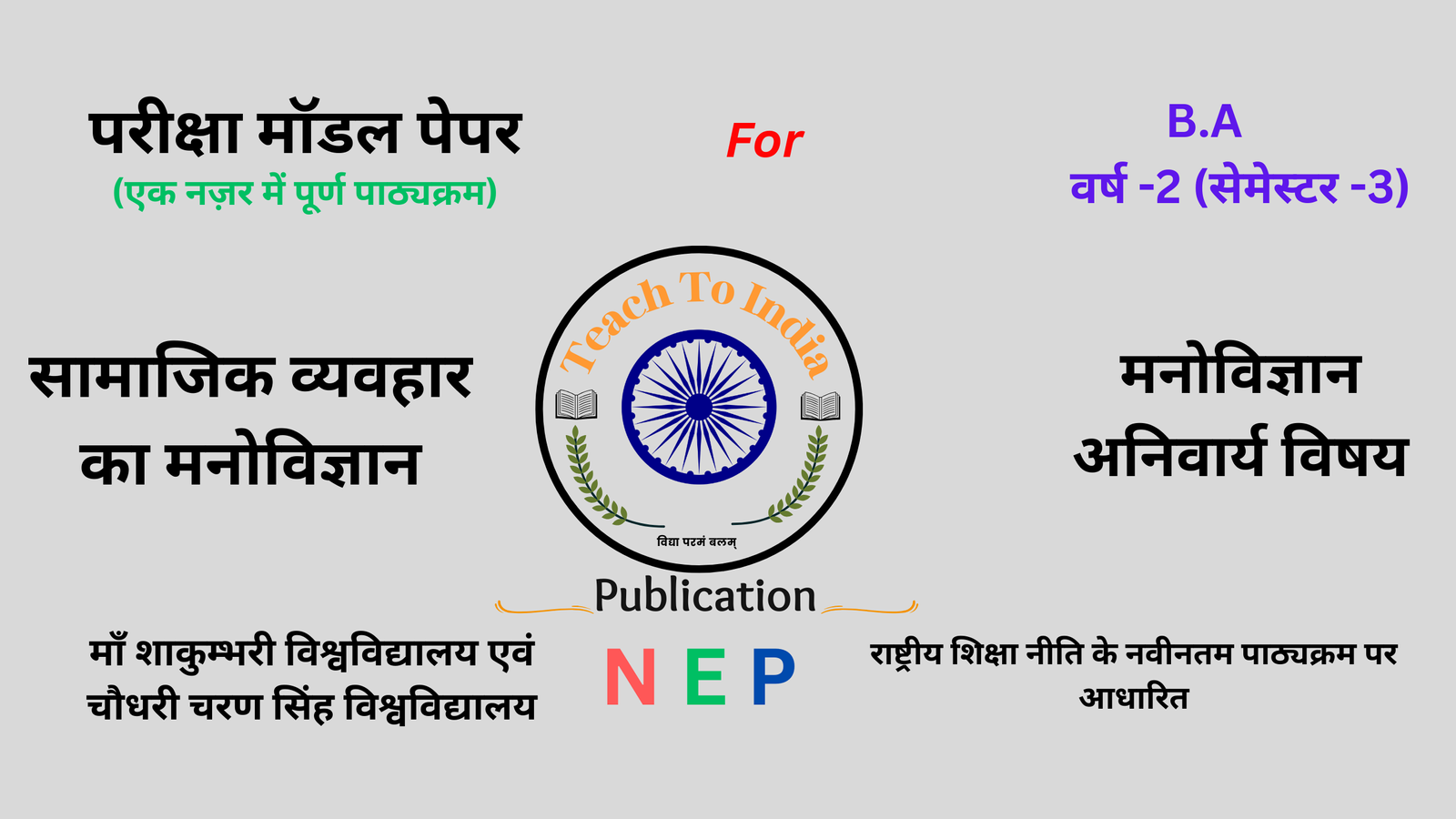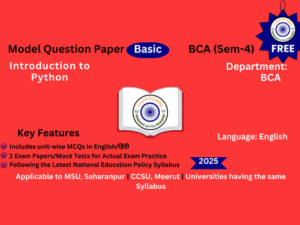सामाजिक व्यवहार का मनोविज्ञान (सेमेस्टर -3)
- Description
- Curriculum
- Reviews

Teach To India प्रकाशन
सामजिक व्यवहार का मनोविज्ञान
-
यह मॉडल पेपर यह सुनिश्चित करता है कि सभी संभावित प्रश्न जो परीक्षा में आ सकते हैं, वे यूनिट में पूरी तरह से शामिल हैं, चाहे वे सीधे हों या अप्रत्यक्ष रूप से।
-
इसे अनुभवी प्रोफेसरों द्वारा बहुत सावधानी से तैयार किया गया है, जिन्हें परीक्षा मॉडल पेपर बनाने का व्यापक अनुभव है।
-
इस पेपर में विश्वविद्यालय द्वारा निर्धारित पाठ्यक्रम के आधार पर सभी मुख्य प्रश्न शामिल हैं।
-
400 से अधिक प्रश्न और उत्तरों के साथ, यह मॉडल पेपर विषय का पूरा पाठ्यक्रम कवर करता है।
-
प्रत्येक यूनिट में दीर्घ उत्तरीय ,लघु उत्तरीय और अति लघु उत्तरीय वाले प्रश्न शामिल हैं ताकि छात्रों को गहन समझ प्राप्त हो सके।
-
हमारे प्रश्न इस तरह तैयार किए गए हैं कि प्रत्येक यूनिट को कम से कम और अच्छी तरह चुने हुए प्रश्नों से कवर किया जा सके।
-
अनिवार्य आंतरिक परीक्षा के लिए हम 200 एक पंक्ति के प्रश्न-उत्तर प्रदान कर रहे हैं, जो प्रत्येक यूनिट को समान रूप से कवर करते हैं।
-
इस मॉडल पेपर में मॉक प्रश्नपत्र / पिछले साल के प्रश्नपत्र भी हल के साथ दिए गए हैं, जिससे छात्रों को परीक्षा के प्रश्नों की गहराई और विस्तार को समझने में मदद मिलती है।
|
Programme /Class: Diploma |
Year: Second |
Semester: Third |
||
|
Subject: Psychology |
||||
|
Course Title: Psychology of Social Behavior |
||||
|
Course outcomes: By the end of the course, students will be able to summarize general information, through in-class discussion and assignments, pertaining to social psychological theories and an opportunity to apply social psychological theories to their lives. Critically evaluate research to understand and explain distressing human social behaviour and relate social psychological concepts and theories to the context of historic and current world, national, and local events. |
||||
|
Credits: 4 |
Core Compulsory |
|||
|
Max. Marks: 25+75 |
Min. Passing Marks: 8+25 |
|||
|
Unit |
Topics |
|||
|
I |
Social Psychology: Nature, and Scope; Methods of Studying Social Behaviour. |
|||
|
II |
Social Cognition: Schema, Schematic Processing. Attribution of Causality: Harold Kelly and Bernard Weiner.
|
|||
|
III |
Attitude: Nature, Formation and Measurement. Interpersonal Attraction: Concept and Determinants.
|
|||
|
IV |
Groups: Norms, Roles, Status & Cohesiveness. Group Influence Processes: Social Facilitation; Social Loafing and Deindividuation
|
|||
|
V |
Aggression: Concept, Theories: Biological (Instinctive and Ethological), Frustration-Aggression Hypothesis, Social Learning Theory of Aggression.
|
|||
|
VI |
Pro-social Behaviour: Motives to help; Bystander Effect; Determinants: Personal, Situational and Socio-cultural.
|
|||
|
VII |
Social Influence Processes: Conformity and Compliance. Intergroup Relations: Prejudice and Discrimination
|
|||
|
VIII |
Leaders and leadership processes: Types and functions of leaders , factors in effective leadership.
|
|||
-
1यूनिट-1: सामाजिक व्यवहार का मनोविज्ञान
-
2यूनिट-2: सामाजिक व्यवहार का मनोविज्ञान
-
3यूनिट-3: सामाजिक व्यवहार का मनोविज्ञान
-
4यूनिट-4: सामाजिक व्यवहार का मनोविज्ञान
-
5यूनिट-5: सामाजिक व्यवहार का मनोविज्ञान
-
6यूनिट-6: सामाजिक व्यवहार का मनोविज्ञान
-
7यूनिट-7: सामाजिक व्यवहार का मनोविज्ञान
-
8यूनिट-8: सामाजिक व्यवहार का मनोविज्ञान







